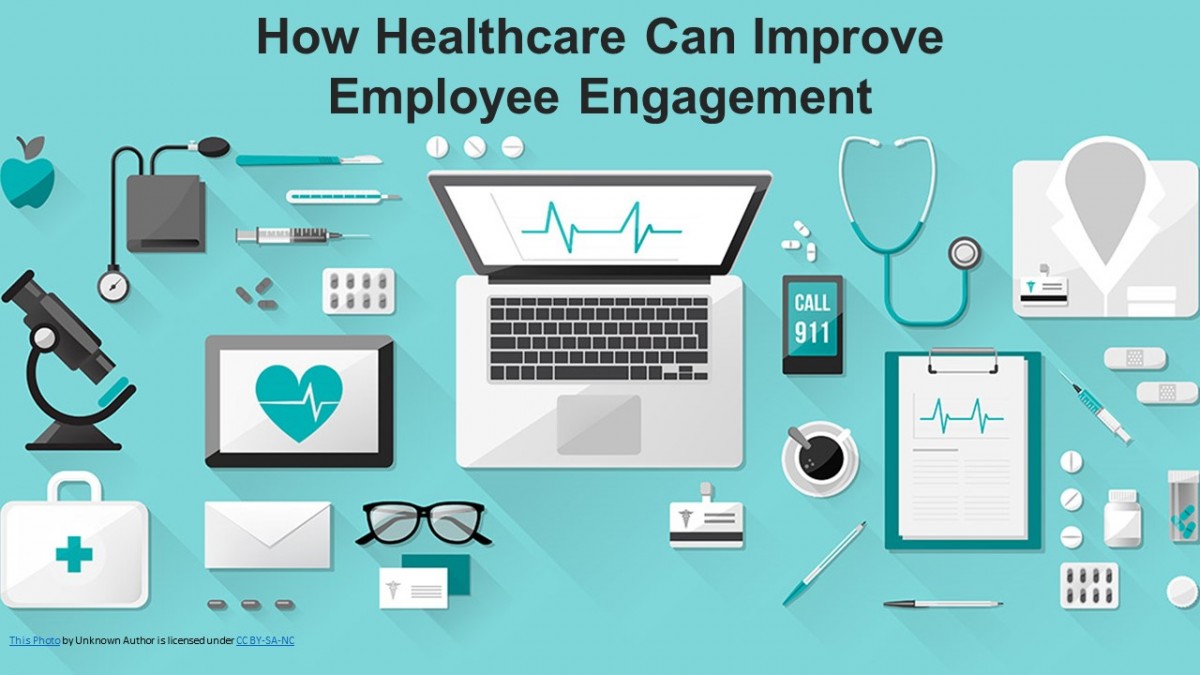Share:

In the healthcare field, there is a strong link between patient outcomes and employee engagement, with nurse engagement being the top predictor of mortality variation across hospitals.
The COVID-19 pandemic has had a tremendous impact on employee engagement among healthcare workers. Healthcare leaders worldwide are struggling to develop strategies to address pandemic-related burnout and stress among caregivers.
The healthcare industry is looking for ways to address this issue. But with such overwhelming working conditions— conditions that are beyond healthcare workers’ control—how can healthcare improve low engagement among employees?
Healthcare can improve employee engagement by offering development opportunities, including leadership coaching, improving communication and feedback, supporting team-building initiatives, recognizing the accomplishments of staff, and providing mental well-being resources to reduce stress and burnout.
In this article, we will take a look at the causes and problems associated with low employee engagement in the healthcare sector and list some strategies for improving engagement.


Why Engagement in Healthcare Matters
There’s probably no industry where high engagement is more important than the healthcare industry, and the pandemic has dealt a devastating blow to engagement due to overwork, burnout, stress, and compassion fatigue.
According to a survey conducted by Mental Health America in 2020, 93% of healthcare workers were experiencing stress, and 76% were experiencing exhaustion and burnout. It is reported that 20% of employees in the healthcare field are disengaged.
These are distressing statistics considering a Johns Hopkins study that found that medical errors are the third-leading cause of death in the U.S.
According to a recent Harvard Business Review article, an analysis of six years of data from over 80 hospitals and 192,000 employees in Victoria, Australia, revealed that even a small (1%) jump in employee engagement leads to a 3% reduction in hospital-related complications and a 7% reduction in hospital readmissions.
Retention is particularly important in the healthcare field. In addition to the costs associated with replacing employees who quit, high levels of turnover can hurt patient access, safety, and the quality of care provided.
Disengaged employees who stay in their jobs may also hurt patient outcomes. They are more likely to make mistakes, not properly follow safety guidelines, and often lack the caring attitude towards patients that engaged employees exhibit.
A commitment to the work an employee does and the meaning they find in their job are major factors in employee engagement. In healthcare, that commitment is necessary for employees to best serve patients.
An awareness that the work they do is meaningful and has a very real impact on the lives of others is essential for a healthcare organization to engage employees who perform well.
Benefits of Engagement in Healthcare
When organizations that provide healthcare have high levels of engagement, employees are more productive, work more efficiently, make fewer errors, and have better patient outcomes.
Engagement can also reduce turnover, lower costs, and boost a hospital’s ratings, improving its reputation. Most importantly, high levels of engagement in healthcare do not just benefit hospitals, physicians, nurses, and first responders—it also benefits patients.
A study by HR Solutions revealed that 85% of engaged employees are more likely to have genuinely caring attitudes toward patients.
High engagement is known to create a positive, collaborative, and harmonious work environment where leadership cares about employees and ensures their needs are being met. This sort of work environment is so important in the healthcare setting, especially when healthcare workers are overwhelmed by a global pandemic that has caused the loss of so many lives.


Strategies for Improving Enagagement
The first step to improving engagement in healthcare is to have a caring culture in place that values employees and continually reminds them of just how important the work they do is.
There are three pillars of employee engagement: cognitive engagement, emotional engagement, and physical engagement. There are many engagement strategies that address the needs of employees in all three dimensions of engagement, and there is potential to utilize them in a healthcare setting and see positive results.
- Development Opportunities: Growth and development are important for frontline healthcare workers as they adapt to this ever-changing landscape. Fostering a learning culture can improve safety and reduce the number of mistakes, improving patient outcomes.
Leadership coaching should be a part of this strategy to ensure there is a sound succession plan to fill roles that are vacated so there is no shortage of talent to step into these roles. - Communication and Feedback: Clear communication and regular feedback are essential for engagement. Healthcare workers want their voices heard, and their feedback can be an invaluable resource for administrators who aren’t experiencing the day-to-day effects of the pandemic the way frontline workers are.
The feedback that can be gained through regular surveys, 1-to-1 meetings, and coaching sessions are essential to maintaining high levels of engagement. They can also help identify and address the attitudes and behaviors of disengaged employees or reveal areas where the organization isn’t authentically practicing its core values or living its mission. - Team-Building Activities: With so many in the industry resigning their positions, or planning on resigning their positions in 2022, creating a real sense that every employee is a valued part of a team that must perform well to see positive patient outcomes is so important for retention, motivation, trust, and overall job commitment.
Encouraging workers to collaborate and work together to achieve positive outcomes is a good strategy, but can only happen when there is a high level of trust among employees and between departments. Some great ways to strengthen teams include inspiring a culture of gratitude, breaking down silos, and avoiding “communication triangles.” - Recognition: Recognizing the accomplishments and contributions of employees is an engagement strategy that works in many settings, and it can be a key driver of engagement for healthcare workers because it builds a positive environment in which employees can build connections.
Organizations that provide healthcare have realized that rewards and penalties for patient satisfaction ratings can significantly affect the bottom line. Regularly showing appreciation for the work they do lets employees know they are making a real impact and that their work is meaningful. - Mental Wellness: Frontline healthcare workers have taken the brunt of the pandemic. In many cases, they have gone above and beyond and put their own health and well-being in jeopardy to serve patients in a setting where constant change is the norm.
This has caused a drastic uptick in work-related stress, anxiety, and depression in the healthcare field that must be addressed. Providing mental and physical wellness resources to help workers cope with stress, burnout, and compassion fatigue should be part of any engagement strategy a healthcare organization implements.
Once these strategies are implemented, it’s a good idea to put some metrics in place to measure engagement to ensure that your strategies are working. Utilizing KPIs to measure engagement levels on a regular basis helps leaders address issues before they become problems with adverse effects.
And remember, no matter the industry or job, It’s so important for employees to see leaders modeling core values and reinforcing the mission on a daily basis to keep them engaged and motivated by a shared purpose.

Matt Tenney has been working to help organizations develop leaders who improve employee engagement and performance since 2012. He is the author of three leadership books, including the groundbreaking, highly acclaimed book Inspire Greatness: How to Motivate Employees with a Simple, Repeatable, Scalable Process.
Matt’s ideas have been featured in major media outlets and his clients include numerous national associations and Fortune 500 companies.
He is often invited to deliver keynote speeches at conferences and leadership meetings, and is known for delivering valuable, actionable insights in a way that is memorable and deeply inspiring.


